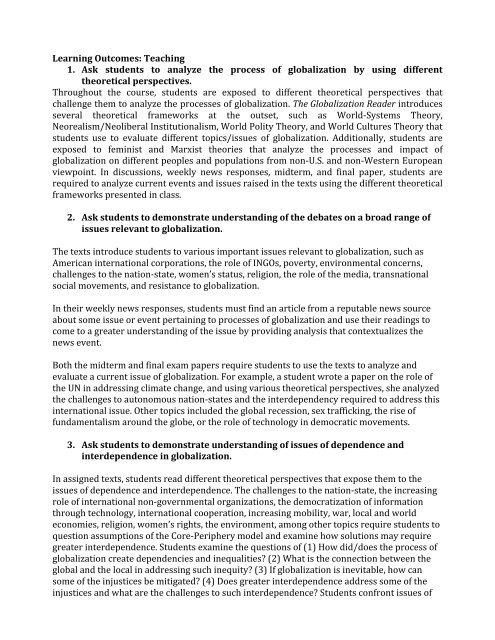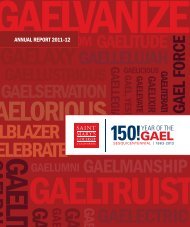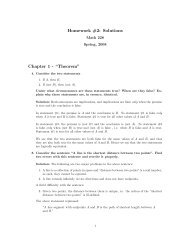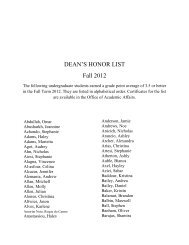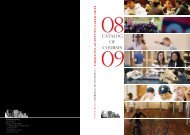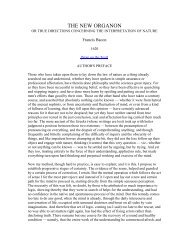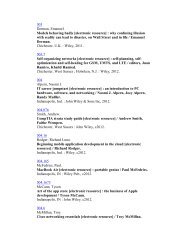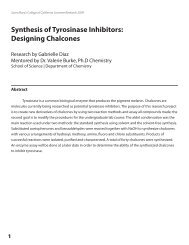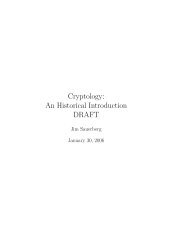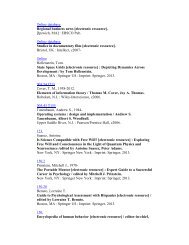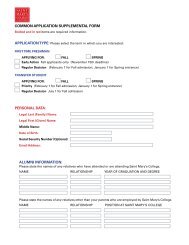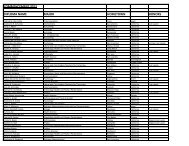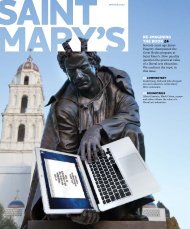Application/Syllabus - Saint Mary's College of California
Application/Syllabus - Saint Mary's College of California
Application/Syllabus - Saint Mary's College of California
Create successful ePaper yourself
Turn your PDF publications into a flip-book with our unique Google optimized e-Paper software.
Learning Outcomes: Teaching 1. Ask students to analyze the process <strong>of</strong> globalization by using different theoretical perspectives. Throughout the course, students are exposed to different theoretical perspectives that challenge them to analyze the processes <strong>of</strong> globalization. The Globalization Reader introduces several theoretical frameworks at the outset, such as World-‐Systems Theory, Neorealism/Neoliberal Institutionalism, World Polity Theory, and World Cultures Theory that students use to evaluate different topics/issues <strong>of</strong> globalization. Additionally, students are exposed to feminist and Marxist theories that analyze the processes and impact <strong>of</strong> globalization on different peoples and populations from non-‐U.S. and non-‐Western European viewpoint. In discussions, weekly news responses, midterm, and final paper, students are required to analyze current events and issues raised in the texts using the different theoretical frameworks presented in class. 2. Ask students to demonstrate understanding <strong>of</strong> the debates on a broad range <strong>of</strong> issues relevant to globalization. The texts introduce students to various important issues relevant to globalization, such as American international corporations, the role <strong>of</strong> INGOs, poverty, environmental concerns, challenges to the nation-‐state, women’s status, religion, the role <strong>of</strong> the media, transnational social movements, and resistance to globalization. In their weekly news responses, students must find an article from a reputable news source about some issue or event pertaining to processes <strong>of</strong> globalization and use their readings to come to a greater understanding <strong>of</strong> the issue by providing analysis that contextualizes the news event. Both the midterm and final exam papers require students to use the texts to analyze and evaluate a current issue <strong>of</strong> globalization. For example, a student wrote a paper on the role <strong>of</strong> the UN in addressing climate change, and using various theoretical perspectives, she analyzed the challenges to autonomous nation-‐states and the interdependency required to address this international issue. Other topics included the global recession, sex trafficking, the rise <strong>of</strong> fundamentalism around the globe, or the role <strong>of</strong> technology in democratic movements. 3. Ask students to demonstrate understanding <strong>of</strong> issues <strong>of</strong> dependence and interdependence in globalization. In assigned texts, students read different theoretical perspectives that expose them to the issues <strong>of</strong> dependence and interdependence. The challenges to the nation-‐state, the increasing role <strong>of</strong> international non-‐governmental organizations, the democratization <strong>of</strong> information through technology, international cooperation, increasing mobility, war, local and world economies, religion, women’s rights, the environment, among other topics require students to question assumptions <strong>of</strong> the Core-‐Periphery model and examine how solutions may require greater interdependence. Students examine the questions <strong>of</strong> (1) How did/does the process <strong>of</strong> globalization create dependencies and inequalities? (2) What is the connection between the global and the local in addressing such inequity? (3) If globalization is inevitable, how can some <strong>of</strong> the injustices be mitigated? (4) Does greater interdependence address some <strong>of</strong> the injustices and what are the challenges to such interdependence? Students confront issues <strong>of</strong>


